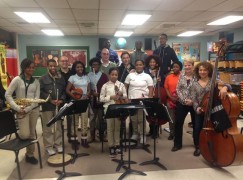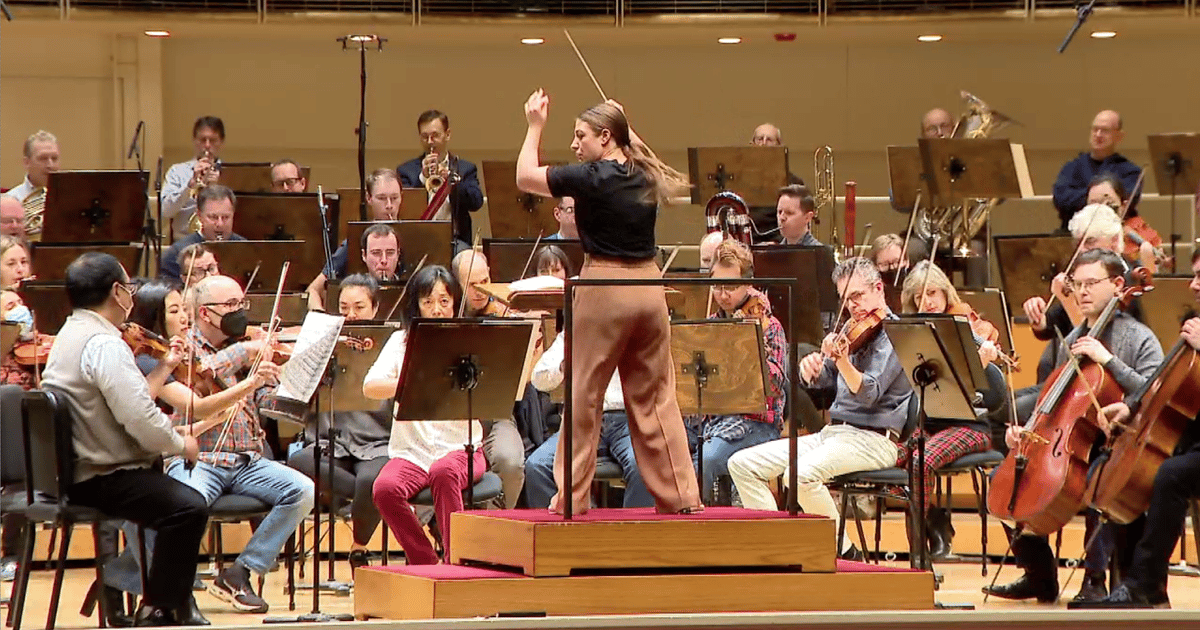Mostly-white orchestras gather to ponder diversity
mainA telling article by Tim Smith in the Baltimore Sun focusses on the imminent annual get-together in his town of the ever-unchanging League of American Orchestras. The headline reads: ‘In Baltimore, the largely white orchestra world talks diversity’.
About 1,000 participants — orchestra administrators, musicians, board members — will fill meeting spaces in an Inner Harbor hotel to explore various aspects of a theme billed as the “The Richness of Difference.”
“This is the first time we’ve made diversity an overarching theme, the focal point of our conference,” said Jesse Rosen, president and CEO of the league, a service organization with about 700 member orchestras. “We thought it was the right time. We want to focus our members’ attention on the importance of the issue so they go back to their communities and have the kinds of conversations they need to have about diversity.”
Matters to be addressed at the conference, hosted by the Baltimore Symphony Orchestra, include the slow pace of changing demographics inside orchestras — 1.8 percent of musicians in league orchestras are African-American, about the same percentage as a decade ago; 85.8 percent are white — and ways to improve that.
Read on here.

I came away from last year’s LAO conference struck by the forced smiles of wilful denial.





The issue is one at an earlier one, which there are many dedicated teachers working for little or for free, the lack of exposure to great music and good training yo prepare American minorities for conservatory training. One very large issue is that the percentage of Asian students in some musical disciplines have taken the majority of spots at good fonservatories, a radical shift from forty years ago. Many fine American orchestras are in fact turning to Asian players to fill their spots. So, it’s not exactly a white male dominated market, but the lack of diversity is sad. What about English orchestras? Isn’t there greater protectionism in that market? I’m curious.
American orchestras are not “turning to” Asian players — it’s just that the Asians are winning the auditions.
Agreed. There was nothing disparaging in the phrase, just your knee jerk reaction. They are winning the spots, the question is, is this making ethnic diversity more difficult by allotting spots to foreign national musicians?
The question about English orchestras is still relevant. What percentage are brought in on work visas from out of country?
What are you talking about? Who is “alotting spots to foreign national musicians”? Do you think there should be no open auditions?
for comparison, at Yale university students are complaining that the English literature curriculum has too many white male authors, and here is a story about a petition against Chaucer, Shakespeare, etc
http://www.nationalreview.com/article/436268/yale-students-major-english-poets-curriculum-has-too-many-white-males
American orchestras could soon be falling under the same spell and the misguided assumption that repertoire must reflect our current diversity by performing more LGBT / ethnic / gender diversified music and neglecting the classics by dead white men.
Could we not just set a standard for quality: performing the best music and hiring the best players, not based on their gender or skin color, but merely based on inherent quality and professional skill? Yes, of course, we need to show that these diverse groups are welcome and give them opportunities, but let’s just not make quotas and limit the performance of composers or by performers who are already established.
All very true.
It is a general problem, disagreeing with what happened in the past and wanting to correct it – in the past:
http://www.slate.com/blogs/xx_factor/2016/05/24/yale_students_want_to_remake_the_english_major_requirements_but_there_s.html
Do you not recognize your own built-in bias?
“American orchestras could soon be falling under the same spell and the misguided assumption that repertoire must reflect our current diversity by performing more LGBT / ethnic / gender diversified music and neglecting the classics by dead white men.”
Why do you assume that it’s a zero-sum game? Or that the “classics by dead white men” are guaranteed superior?
In addition, you ignore the overlap. Tchaikovsky’s music is both “classics by dead white m[a]n” *and* LGBT. Ditto Copland, Bernstein, and many others.
‘Classics’ ARE superior, and don’t need a ‘garantee’. The core repertoire has qualities, partly thanks to, and partly in spite of, the times in which it was conceived. Musical quality is not determined by political (in-)correct circumstances.
Wait — aren’t you the one who argues against historicism and historical determinism? Shouldn’t that work in reverse as well?
Just as new music is not deterministically better than older music, so too old music is not automatically better than new music.
Or does your traditionalism outweigh your rejection of determinism?
Bravo. Totally agree.
There is no diversity problem; the problem is one of inclusivity. All any orchestra or management has to do is ask US who is and where are the capable and prepared classical instrumentalists and conductors of color, because any one of us could point them to literally dozens of musicians of African descent who are ready for their closeup. However, they don’t ask, and instead they have conferences and junkets to wring their hands about why there aren’t enough of whatever flavor they’re looking for. There are more than enough, already present and ready; they merely have to ask those who know. Tell them to give me a call, and I’ll help them out.
It’s a major dilemma.
Orchestras hire the most talented, trained, and experienced musicians they can, based on blind auditions.
In order for the orchestras to increase diversity, they need to have more diversity in the pool of auditioners. This process has largely succeeded with women and with those who are Asian or of Asian descent.
It has not yet succeeded to the same degree with other minorities.
Why not?
In order for the pool of auditioners to be more diverse, there needs to be more diversity of the students coming out of conservatories, universities, and colleges, who are adequately prepared for the auditions.
In order for the pool of college-level students to be more diverse, there needs to be more diversity of the students coming out of high schools.
Etc.
The farther back we trace these steps, the closer we come to the core problem.
My point is that there is already a plentiful supply, and that there are many more coming behind them as well. There is no crisis if you know where to look.
I’m not trying to be funny. I am trying to understand your point.
It appears to contradict itself: the supply is “plentiful,” if you “know where to look.”
But if the supply is plentiful, why do we need to “know where to look?”
What is an example of where to look? I confess that I know little about the music programs at, say, historically black colleges and universities, although I’m aware that they exist. Is that an example of what you mean?
I know that when I was in grad school, there was, I think, only one African-American in the orchestra (a cellist). There may have been an undergrad voice major as well. (I didn’t cross paths with singers very often.)
It is good news, if you’re correct that there are “many more coming behind them.” Diversity will not improve at the symphony orchestra level without a supply of candidates. Can you point us to some examples of this? I don’t mean individuals (although that also is welcome), but significant numbers of them. I want to learn more.
Want to find a black musician? Ask a black musician. If an orchestra is looking for a conductor, they can call me – I’m not hard to find. If they don’t want to hire me, they can ask me about others and I could readily provide plentiful names. It’s all around them, but they’re only asking the people they know rather others who know and have access to those who names haven’t crossed their personnel managers’ desk. Regarding the next generation, I’ve seen far more black students in music schools in the last ten years than there ever were when I was at conservatory. An interesting point is that many (perhaps most) are involved in music of other genres, and after graduation many of them decide to pursue those other genres because of potential remuneration and the greater difficulty of establishing a classical career in today’s arts environment.
Honestly, I didn’t realize black musicians played better than white. You learn something every day!! I always knew they were probably better jazz musicians, but there you go…
Let’s just make sure we give all the egg-headed pencil-necked orchestra managers “room to destroy”.
http://d16ao1gdhk6qlj.cloudfront.net/wp-content/uploads/2014/09/8-smash-cultural-marxism.jpg
And your picture with its senseless caption proves what exactly?
Centre of equal daughters, equal sons,
All, all alike endear’d, grown, ungrown, young or old,
Strong, ample, fair, enduring, capable, rich,
Perennial with the Earth, with Freedom, Law and Love,
A grand, sane, towering, seated Mother,
Chair’d in the adamant of Time.
Quarter of a century later, it’s all still a ‘disgrace’: http://www.nytimes.com/1993/07/11/arts/classical-view-be-smart-as-a-lemming-orchestras-are-told.html?pagewanted=all